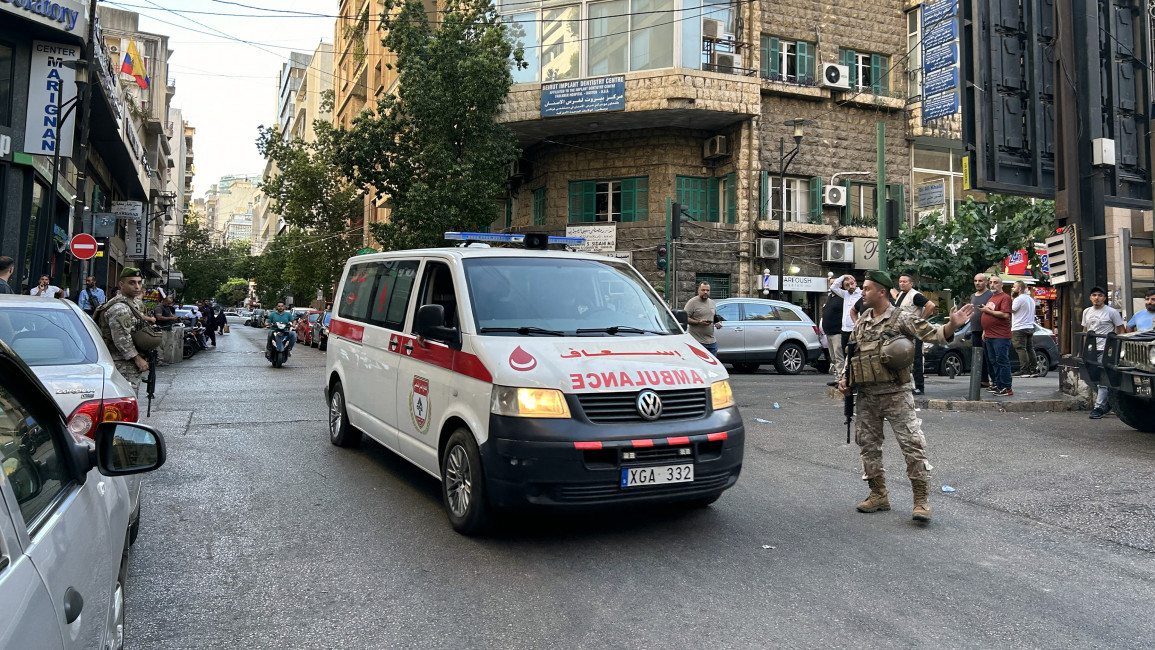Lebanon's sapped health sector faced immense strain after Israeli-linked pager, walkie blasts
Lebanon's healthcare sector, which has suffered for years due to a plethora of economic and political crises, was put to a real test by this week's string of shocking attacks by Israel, in which communication devices were turned into bombs.
In a span of minutes, thousands of Israeli-linked blasts that began on Tuesday through Wednesday brought a flood of casualties in need of urgent medical care to the doorsteps of largely-debilitated hospitals. Sirens of ambulances wailed for days, patients were rushed into intensive-care units continuously, and medical staff were overwhelmed.
"We've been doing 20-hour shifts in a bid to keep up. For the first time since this war began, it actually felt like we were at war," a nurse in a main Beirut hospital, told The New Arab. "There were 15 of us [nurses] on the ward, in one shift, and I handled over a 100 patients on the first day," she stated, adding that "the cases brought in were horrifying". She asked not to be named since she wasn't authorised to speak to the press.
She described how patients filled up hospital rooms and soon overflowed in hospital hallways and corridors where beds were set up to accommodate those who kept coming in, with amputated limbs, acute burns and pierced eyes. "We've been watching this unfold in Gaza. It felt like we were living in Gaza," she said in sorrow.
A month before the attacks, a World Health Organisation (WHO) report said most hospitals across Lebanon were working at around 50% capacity due to fiscal and financial restrictions. Shortages in medical supplies and medications has become the norm, and in 2023, only 2000 out of a total capacity of around 13,000 beds across 27 operational public hospitals were available. Private hospitals were hit too. The report issued on 14 August said that more than 30 percent of private hospital beds are closed, average monthly inpatient admissions were down by at least 15%, and all because of the financial crisis that has seen the downward spiral of the Lebanese lira. Since the onset of the financial crisis in 2019, the lira has lost more than 90 percent of its value.
But when the attacks happened, wounding over 3,000 people on Tuesday, and hundreds more on Wednesday, the whole sector sprung into action. According to the Lebanese health minister, 100 hospitals took in the sweeping majority of patients brought in. Only a small number were taken to Syria and Iran for treatment.
Handling a surge of cases
To have been able to handle this number of injuries is in itself a massive accomplishment, agreed health experts.
"We were ready. We had simulated this many times before under the Health Ministry's guidance: doctors were trained on how to handle a surge of cases, how to distribute large numbers of patients and the resources among hospitals," head of the Syndicate of Private Hospitals in Lebanon, Suleiman Haroun, told TNA.
Echoing the same opinion, MP Dr Abdul Rahman Al-Bizri said that the "The training and manoeuvres that were conducted previously, and the plan that was prepared by the government emergency committee, led to improving the effectiveness of this medical sector, despite its basic suffering from a flagrant lack of capabilities. However, this sector was able to deal with this huge incident, and proved that Lebanon is capable of confronting it effectively and in a manner befitting the size of the challenge posed by the Israeli enemy. The health sector was at the forefront of confronting this aggression."
That being said, healthcare workers said the load was a hefty one. "The pressure was immense, and we have had to perform surgeries through consecutive nights to be able to treat all patients, most of whom are critical cases," noted Haroun.
Ellyas Jarada, an ophthalmologist and a lawmaker, said he performed "surgeries that would run for two to four hours, back to back. There were no mild conditions. All those hurt were in serious conditions—mostly people who sustained injuries to their eyes, losing their eyesight, and suffered facial disfigurement," said the physician. Speaking in a voice hoarsened by exhaustion, he added that he also had to tend to amputated patients.
But the sector cannot sustain this. According to Al-Bizri, dealing with an emergency and crisis is one thing, and to deal with a prolonged war is another. "Although hospitals were ready and doctors were prepared, everything the health sector provided yesterday was from its own stock. In the event of a long war or extended clashes, we need a different approach that ensures the continuity of the sector in the long term, as we cannot rely solely on the current stock," he affirmed.
Harroun agreed, saying that while covering expenses incurred by private hospitals weren't discussed, the sector’s ability to keep up largely depends on the funds made available.
Jarada, who has been in the Beirut-based hospital since Tuesday, said the pressure hasn't slowed down. "The surgeries are still ongoing. The cases are still coming in. We're doing our best," he said weakly.
This piece was published in collaboration with Egab.





 Follow the Middle East's top stories in English at The New Arab on Google News
Follow the Middle East's top stories in English at The New Arab on Google News
![Elon Musk and Donald Trump [Getty]](/sites/default/files/styles/image_330x185/public/2176994757.jpeg?h=a5f2f23a&itok=PAd82XXu)
![Israeli strikes on Lebanon [Getty]](/sites/default/files/styles/image_330x185/public/2183771465.jpeg?h=a5f2f23a&itok=6HT85VH2)
![Mike Huckabee [Getty]](/sites/default/files/styles/image_330x185/public/472248078.jpeg?h=d5a1c78c&itok=aWqBejYY)